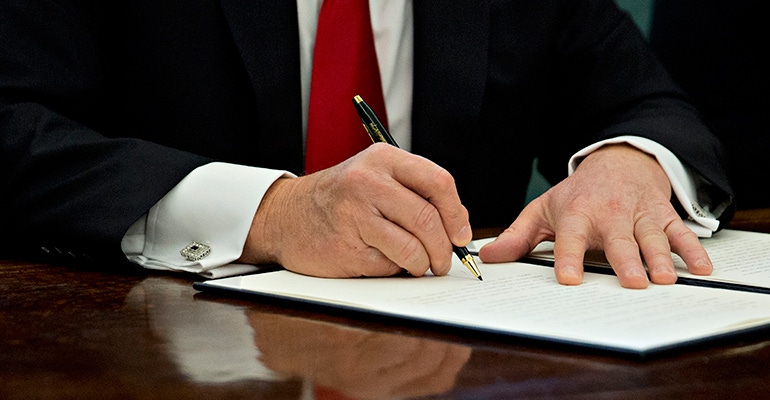October 7, 2019

Updated 8:11 a.m. Oct. 8, 2019
Farm and commodity group leaders joined President Trump for a commemorative signing of a U.S.-Japan Trade Agreement on Oct. 7.
The deal is a limited agreement, but it is expected to benefit U.S. farmers.
"This agreement provides certainty and stability in our second largest corn market, brings sorghum imports to a zero tariff level immediately and reduces the import markup on barley,” said U.S. Grains Council Chairman Darren Armstrong, a corn farmer from Hyde County, N.C.
Japan purchased more than $2 billion worth of corn in the most recent marketing year.
“This is a high-value market for our livestock industry, therefore, also a major purchaser of U.S. corn through exported meats,” said National Corn Growers Association President Kevin Ross. “This agreement reaffirms and builds on our trading relationship with Japan and NCGA looks forward to continued work for a successful Phase 2 of these important negotiations.”
U.S. Wheat Associates and the National Association of Wheat Growers leaders were excited by the news as U.S. wheat represents about 50% of all the wheat Japan imports each year, currently valued at more than $600 million. That volume represents more than 10% of total annual U.S. wheat exports.
“As we hoped, the text confirms that the agreement will put U.S. wheat back on equal footing with wheat from Canada and Australia when it is implemented,” said U.S. Wheat Associates President Vince Peterson, who attended the event at the White House. “In addition, Japan has agreed to open country specific quotas for U.S. wheat and wheat product imports.”
The Oct. 7 signing ceremony marked the end of more than a year of negotiations.
“This agreement means sharply lower tariffs on our farm and ranch exports with the promise of more to come,” said American Farm Bureau Federation President Zippy Duvall. “And while we aren’t yet finished opening this market, the conclusion of these talks means we can now trade with Japan with the same advantages enjoyed by signers of the CP-TPP trade agreement.”
The new agreement takes effect Jan. 1, 2020.
“This agreement was essential so that U.S. agricultural products were not put at a competitive disadvantage compared to the preferential tariff treatment accorded the 10 other countries signing onto the Comprehensive and Progressive Agreement for Trans-Pacific Partnership following the United States’ withdrawal from the Trans-Pacific Partnership trade accord, as well as the Japan-European Union trade agreement,” said National Grain and Feed Association President and CEO Randy Gordon. "NGFA also commends U.S. and Japanese trade negotiators for their commitment to engage in a second stage of trade negotiations starting in April that will focus on addressing additional agricultural tariffs, as well as important sanitary and phytosanitary and non-tariff barriers to trade.”
About the Author(s)
You May Also Like




